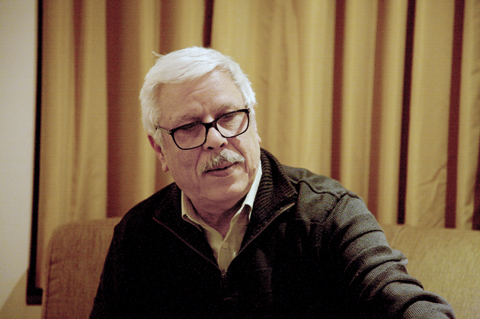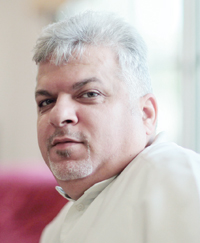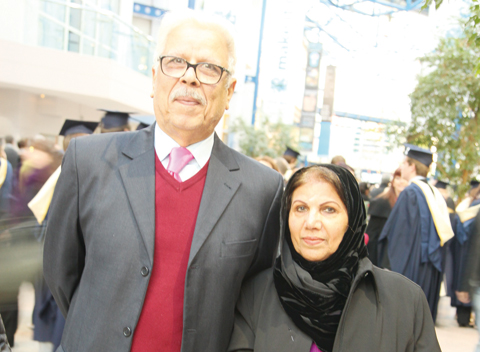'I was truly born again'
 KUWAIT: Retired Maj Gen Hassan Jassem Hussein.
KUWAIT: Retired Maj Gen Hassan Jassem Hussein.KUWAIT: He was warned: surrender or be dragged from his home, in front of his wife and children, and be humiliated. That was how Retired Maj Gen Hassan Jassem Hussein knew that the Iraqi occupation forces were looking for him.
Speaking this week at his home in Salwa, Hussain recalls his experiences during the Iraqi invasion and occupation of Kuwait. The former police officer served as the assistant director of security of the Hawally governorate in 1990 and after the Invasion, was a supporter of the Kuwaiti Resistance and later taken as a prisoner of war.
After three months of phone calls from Iraqi military warning him to turn himself in, Hassan decided to go into hiding. He moved his family to his father-in-law's house in Khaldiya and assumed a fake identity as a teacher. But the subterfuge failed when the Iraqis started looking for his 23-year-old son, a citizens' band radio enthusiast.
"As soon as we learned that Iraqi forces were invading Kuwait, I went to my office like other policemen to follow the situation, spreading our men in all areas of Kuwait on the first day of the invasion. We continued to operate from our sites for three consecutive days, until they took control of the whole country. So we had to withdraw and go back home," Hassan told Kuwait Times. "We helped the Kuwaiti resistance as much as we could, from distributing leaflets to supplying weapons. On January 13, just three days before the coalition airstrikes began, they arrested me with my son. We spent a night at the Jewan camp in Kuwait before they took us to Baghdad," he recounted.
 Ali Hussein — Photos by Athoob Al-Shuaibi
Ali Hussein — Photos by Athoob Al-ShuaibiAli, the eldest son of Hassan, was a CB radio hobbyist along with his friends, and had no connection with the Kuwaiti resistance, unlike his father. "The soldiers sometimes spoke to us through the radio, but this didn't bother us at all. They wondered why we were using these radios, so I answered them quietly that it was simply a hobby and was allowed in Kuwait," Ali recalled. "But after the Iraqi intelligence discovered that some Kuwaitis were using CB radios to communicate with neighboring countries, they hunted us one by one, until they found me and my father. They took us in front of my mother and my younger siblings," he added.
When the Iraqi soldiers arrived at their hideout, Ali's mother, Makiya Al-Bannay, rushed to tell her husband about the intelligence officers at the door. "Hurry, we're in peril. They have definitely found you," she told her husband. "I hid the radios inside the washing machine. But they searched everything in the house and found them. The world shattered in front of me, as my husband and my dear son were led away before my eyes amid the wails of my other kids," Makiya told Kuwait Times.
"The soldiers told me that I shouldn't worry, and claimed that it was only an investigation and my husband and son will be returned later. But they lied. Days and months passed with no news. I didn't know whether they were dead or alive. I cried a lot and couldn't eat. How could I eat while they were hungry?" Makiya said, fighting back tears as those memories were rekindled, as if they occurred yesterday. Even after 26 years, the pain is still there.
 Retired Maj Gen Hassan Jassem Hussein and his wife Makiya Al-Bannay
Retired Maj Gen Hassan Jassem Hussein and his wife Makiya Al-BannayImprisoned in Iraq
Hassan and his son were first taken to a police station. On the same night, they were transferred with other Kuwaiti prisoners to Arifjan military base. One night before the airstrikes began, they were shifted to Baghdad, on Jan 17, 1991.
Thousands of Kuwaitis and expats were killed, beaten or tortured during the occupation. More than 600 Kuwaitis were taken prisoner - with most never to be seen alive again. Tens of thousands were forced to flee their home and live abroad as refugees during the entirety of the conflict.
"My CB radio friends were tortured before me in order to force them to reveal the names of the people involved. My good fortune was that I was the last to be interrogated, so there was no reason for them to torture me," explained Ali.
Ali was separated from his father, who had been placed with other Kuwaiti prisoners of war at the Rasheed camp. Meanwhile, Ali was remanded with 45 prisoners in a special detention center of the Iraqi intelligence in Baghdad, where cases were registered against them.
At the intelligence building, Ali and the other prisoners were held in a dark, narrow underground cell. They were only permitted to go to the bathroom twice a day - once in the morning and again just before sunset. They showered only once. "It was hard for us to move around and sleep in that cell. The only food we had was rice, cabbage soup and rock-hard bread. We were told that we were at the mercy of our cases and were destined for death. They had isolated us completely. No wonder no one could see us. Due to the lack of sunlight and malnutrition, our faces had yellowed. There was no means of entertainment besides our conversations with each other," Ali told Kuwait Times.
Meanwhile, Hassan was reunited with his fellow officers from the police, army, national guard, navy and air force at Baqouba prison. "Our numbers were between 600 to 700 prisoners. Among us were technical and electrical engineers, while others were artists and athletes. During our period of detention, our talents emerged in recycling and inventing the impossible. From some abandoned telephone cables, we managed to run electricity for lighting. Other prisoners invented a primitive water heater and connected it to our toilets using pipes. We also made rosaries and sculptures from date seeds," he narrated.
"Before I arrived there, families and friends were permitted to visit the prisoners and give them food and a lot of Iraqi dinars. But, they stopped after the airstrikes."
Operation Desert Storm
A US-led coalition of 33 countries launched the Gulf War to oust Iraqi forces from Kuwait. 'Operation Desert Storm' lasted from 17 January to 28 February 1991. In November 1990, the UN Security Council gave a deadline of 15 January 1991 to Saddam Hussein to withdraw his troops from Kuwait. After the deadline passed, coalition strikes targeted Iraqi army locations inside Kuwait and Iraq.
The Baghdad intelligence building and Baqouba prison where Ali and his father Hassan were imprisoned were bombed. "I cautioned my colleagues not to go out to watch due to the danger of flying shrapnel," Hassan said. On the other hand, his son couldn't see anything. He could just hear the sound of explosions amid a state of severe panic and fear that their cell would be destroyed. "We were saved by Allah," said Ali.
Rescue and release
Relief came from the Red Cross a month after the victory of coalition forces. Hassan and his son had spent three months in detention. They were freed and set up for the return trip to Kuwait through Ramadi in Iraq, from where they were taken in buses to Arar in Saudi Arabia. Ali had still not seen his father. He arrived in Kuwait on March 26, while his father flew in to his liberated homeland.
"My mother was the first person I hugged. I was truly born again" Ali recounted. With tears in his eyes, Hassan recalled the moment he saw the skyline of Kuwait smothered in black smoke. "What an unforgettable image it was. Sadness hung over my country. He (Saddam) must have burnt Kuwait before he left," he realized.
The Kuwaiti government managed to rebuild the country's infrastructure and save the natural environment in record time. But many still wonder if the Kuwaiti society learned a lesson from the invasion, or is it again repeating the same mistakes...
By Athoob Al-Shuaibi










